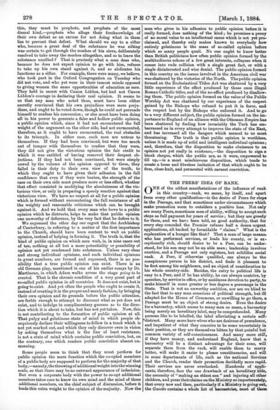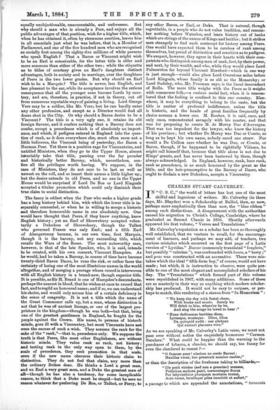THE PEERS' IDEA OF RANK.
ONE of the oddest manifestations of the influence of rank in this country—rank, we mean, by itself, and apart from every other qualification—is the desire of Peers for steps in the Peerage, and that sometimes under circumstances which make promotion seem to outsiders a positive loss. Not only are many Peers, sometimes men of ability, willing to accept such steps as full payment for years of service ; but they are greedy for them, and we hays been told, on good authority, that for every step conceded the Premier refuses half a dozen urgent applications, all backed by formidable " claims." What is the explanation of a hunger like that ? That a man of large means, who has performed services, or leads his county, or is ex- ceptionally rich, should desire to be a Peer, can be under- stood, for his son may not be an able man ; leadership involves exertion, and a Peerage not only registers, but solidifies social rank. A Peer, if otherwise qualified, can always be the conspicuous person in his district, and finds it pleasant to be first among his neighbours, and an object of consideration to his whole country-side. Besides, the entry to political life is easy to a Peer, and if he has ability, he can always contrive, by speeches, by service in office, or by assiduous devotion to party, to make himself in some greater or less degree a personage in the State. That is not an unworthy ambition, nor are we blind to the fact that to any man conscious of political strength, bat ill adapted for the House of Commons, or unwilling to go there, a Peerage must be an object of strong desire. Even the desire for a baronetcy, which seems to many men so mean, a baronetcy being merely an hereditary label, may be comprehended. Many persons like to be labelled, the label alleviating a certain self- • distrust. Many more have wives who are desirous of precedence, and impatient of what they conceive to be some uncertainty in their position, or they are themselves bitten by that painful but common variety of self-consciousness. And many more still, if they have money, and understand England, know that a baronetcy will be a distinct advantage for their sons, will separate them from the rack, will enable them to marry better, will make it easier to please constituencies, and will in some departments of life, such as the national Services and the Church, render their promotion decidedly more rapid. Their services are never overlooked. Handreds of appli- cants; therefore, face the one drawback of an hereditary title, the necessity of " making an eldest son" and injuring all other children, and press their claims on the Ministry so importunately, that every now and then, particularly if a Ministry is going oat, the Gazette contains a whole list of baronetcies, most of them
equally unobjectionable, unaccountable, and unforeseen. But why should a man who is already a Peer, and enjoys all the public advantages of that position, wish for a higher title, which, when he has obtained it, often by strenuous exertion, leaves him in all essentials just what he was before, that is, a Member of Parliament, and one of the five hundred men who are recognised as socially first among the eighty-five millions of white persons who speak English ? That a Baron or Viscount might wish to be an Earl is conceivable, for the latter title is older and more sonorous than either of the other two ; while the etiquette as to titles of courtesy gives an Earl's daughters distinct advantages, both in society and in marriage, over the daughters of Peers in the two lower grades. But why should an Earl wish to be a Marquis ? The title is newer, less English, and less pleasant to the ear, while its acceptance involves the serious consequence that all the younger sons become Lords by cour- tesy, and are, therefore, in practice, if not in theory, cut off from numerous reputable ways of gaining a living. Lord George Vere may be a soldier, like Mr. Vere; but he can hardly enter any other profession, and except as a Director would find all doors shut in the City. Or why should a Baron desire to be a Viscount ? The title is a very ugly one, it retains its old foreign flavour, and it confers nothing that a Barony does not confer, except a precedence which is of absolutely no import- ance, and which, if pedigree entered in England into the ques- tion of rank, as it does everywhere else, must often seem not a little ludicrous, the Viscount being of yesterday, the Baron a Norman Peer. Yet there is a positive rage for Viscountcies, and untitled Ministers, when they go to the Upper House, almost inlvariably take that title, passing over the far prouder and historically better Barony, which, nevertheless, con- fers all the privileges worth having. We suppose, in the case of Ministers, they do not care to be last as well as newest on the roll, and so insert their names a little higher up ; but the desire extends to old Peers, and no one in the Upper House would be surprised if Lord De Ros or Lord Kingsale accepted a titular promotion which could only diminish their true claim to social distinction.
The fancy is oddest when the Peer who seeks a higher grade has a long history behind him, with which the lower title is in- separably connected, or when he is willing to merge a historic and therefore honourable name in one absolutely new. One would have thought that Peers, if they knew anything, knew English history ; yet an Earl of Shrewsbury accepted volun- tarily a Dukedom of Shrewsbury, though the Talbot who governed France was only Earl ; and a fifth Earl of Abergavenny became, in our own time, first Marquis, though it is the barony, not any succeeding title, which recalls the Wars of the Roses. The most noteworthy case, however, is that of the late Speaker, who, it is said, intends to be created, with his own consent, Viscount Hampden. As he would, had he taken a Barony, in course of time have become twenty-third Baron Dacre, he runs the risk, or rather faces the certainty of losing one of the most illustrious names in the world altogether, and of merging a peerage whose record is interwoven with all English history in a brand-new, though superior title. It is possible, as Sir H. Brand is one of Hampden's descendants, perhaps the nearest in blood, that he wishes at once to record that fact, and to regild an honoured name; and if so, we can understand his choice, and would only accuse him of a certain deficiency in the sense of congruity. It is not a title which the name of the Great Commoner calls up, but a man, whose distinction is not that he was of ancient lineage, or one of the largest pro- prietors in the kingdom—though he was both—but that, being one of the greatest gentlemen in England, he fought for the people against the Crown. His name, to persons of historic minds, goes ill with a Viscountcy, but most Viscounts have not even the excuse of such a wish. They assume the rank for the sake of the " rank,"—that is, precedence only. We suppose the truth is that Peers, like most other Englishmen, are without historic minds. They value rank as rank, not history; and testing rank in the only way open to them, by the scale of precedence, they seek promotion in that scale, even if the new name obscures their historic claim to distinction. They do not feel that claim, any more than the ordinary Briton does. He thinks a Lord a great man, and an Earl a very great man, and a Duke the greatest man of all—though he has also a tendency, for some inexplicable reason, to think that a Duke must be stupid—but he sees no reason whatever for preferring De Ros, or Talbot, or Percy, to any other Baron, or Earl, or Duke. That is natural, though regrettable, in a people who do not value tradition, and remem- ber nothing before Waterloo, and learn history out of books which are strings of the names of Kings and battles ; but it strikes men strangely to find such contempt for history among Peers. One would have expected them to be careless of rank among themselves, but proud of distinction and sensitive as to pedigree. We suspect, however, they agree in their hearts with their com- patriots who distinguish among men of rank, first, by their power, and next, by their wealth, and who, while they would place Lord Palmerston far beyond Viscount Hereford—which in one way is just enough—would also place Lord Overstone miles before Lord Kingsale, whose family is as old as the Monarchy; or Lord Sudeley, who, Mr. Freeman says, is the lineal descendant of Rollo. The mere title weighs with the Peers as it weighs with commoner folk,—a curious social fact, when it is remem- bered that the feeling is confined to this one country. Else- where, it may be everything to belong to the caste, but the title is matter of profound indifference, unless the title is historic, and the heads of great families frequently by choice assume a lower one. M. Rouher, it is said, once, and only once, remonstrated savagely with his master, and that was for proposing to create M. de Morny Due d'Auvergne. That was too impudent for the lawyer, who knew the history of his province ; but whether De Morny was Duc or Comte, so long as he kept his own name, nobody cared one straw. Nor would a De Crillon care whether he was Duc, or Comte, or Baron, though, if he happened to be rightfully Vidame, he might call himself that, because that title alone is not due to Kings' grants, and has never been bestowed by them, though always acknowledged. In England, however, rank, bare rank, rank as precedence, is as much honoured by the great as the little, and the heir-presumptive to the Barony of Dacre, who ought to disdain a new Dukedom, accepts a Viscountcy,



































 Previous page
Previous page